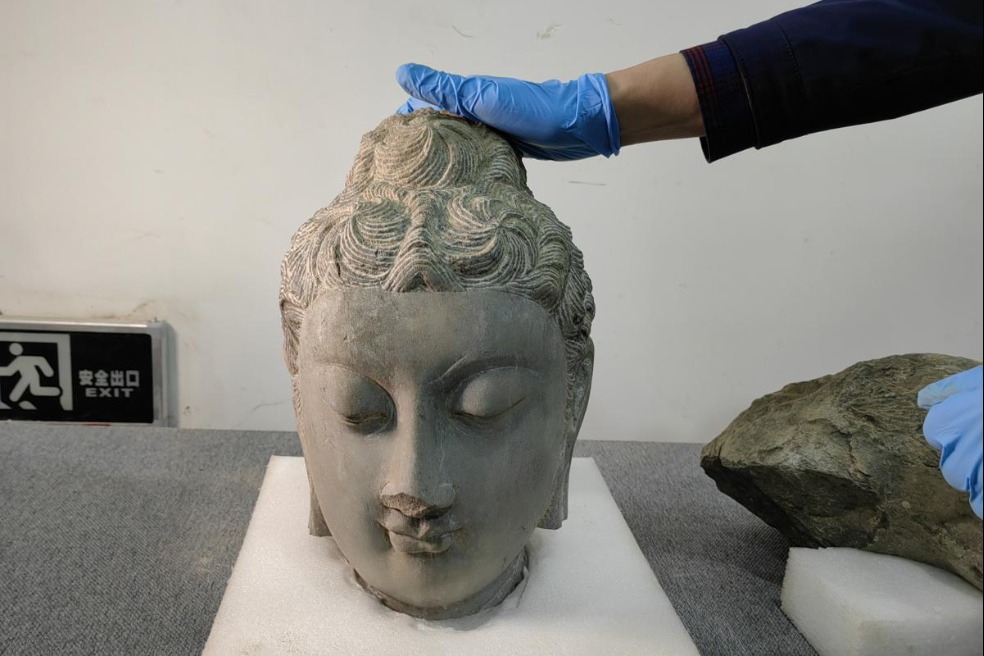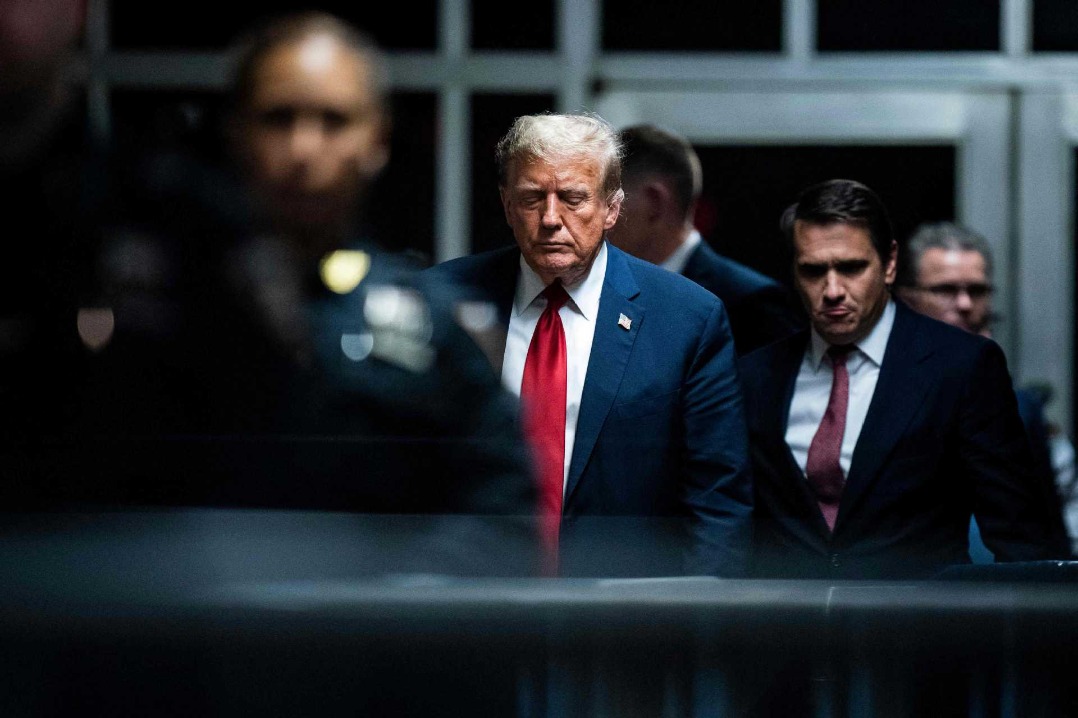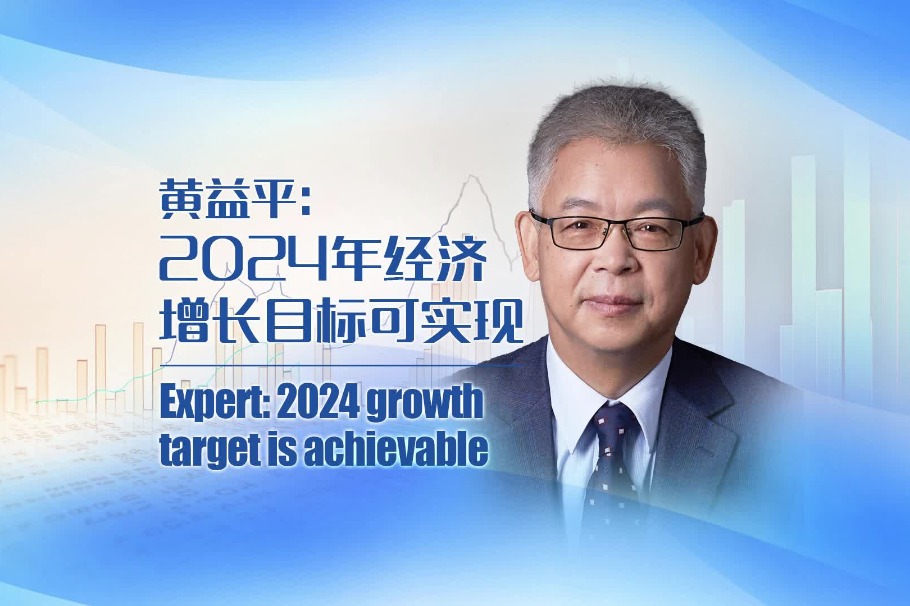Experts' take on China-EU relations
China Daily | Updated: 2023-12-08 08:05

Editor's note: China-EU relations enjoy a good momentum of consolidation and growth. Relationship between China and Europe is essential to global peace, stability and prosperity, and it is incumbent on both sides to provide greater stability for the world, stronger impetus for development, and more inspiration and support for global governance. Three experts offer their insights to China Daily.
Revisiting Brussels' de-risking policy
By Klaus F. Zimmermann
Mitigating risks in EU-China relationships has become a prominent focus in contemporary policy discussions. The concept of "de-risking", a widely recognized strategy in financial and business domains aimed at diversifying risks to enhance the management of opportunities and challenges, proves equally valuable in the realm of international relations.
Re-examining this strategy is imperative, signifying a deliberate and repeated assessment to guarantee that the risk reduction process does not inadvertently result in significant losses of the substantial benefits derived from fostering deeper international collaborations.
The China-EU Summit, held in Beijing on Thursday, signifies the first in-person summit in four years. The event presents a pivotal occasion to explore the expansive collaboration prospects between China and the European Union, with special focus on key areas such as climate change and trade. And to make it productive, the EU expects China to take on increased responsibility in addressing global challenges within the framework of a rules-based international system, thereby fostering peace and security.
China is pursuing the ratification of the Comprehensive Agreement on Investment (CAI), a proposed deal between China and the EU. The agreement, already endorsed in principle by EU leaders in December 2020, still awaits ratification by the European Parliament.
For the EU, the CAI seeks to enhance market access for EU companies in China, addressing issues of asymmetry in market openness. It also seeks to establish explicit regulations on Chinese State-owned enterprises, "subsidy transparency", and prohibits practices such as "forced technology transfers", aiming to create a fairer and more balanced economic relationship. As such, the CAI can help stabilize the interest of EU business leaders to invest in China and to further develop trade relationships.
The concerns surrounding the signing of the CAI and its potential impact on the EU's strategy of de-risking its relations with China are multifaceted, with a predominant emphasis on the political implications of economic considerations. The ultimate outcome, however, remains contingent on the precise terms of the agreement and the manner in which it is executed.
Opponents of the CAI raise the specter of interference in market mechanisms and a departure from established rules governing market economies. This apprehension is rooted in the fear that such deviations could undermine globalization efforts and erode the integrity of market mechanisms. Furthermore, there are valid concerns that the agreement may inadvertently exacerbate existing trade imbalances, posing challenges to the EU's efforts to foster equitable economic relationships.
A recurring argument against the CAI revolves around the potential misuse of China's rising economic prowess. Critics posit that China might leverage its economic strength to exert economic and political pressure on other countries, thereby compromising their independence. This fear is grounded in the belief that the EU, by entering into such agreements, may find itself vulnerable to undue influence, undermining its autonomy on the global stage.
However, it is important to recognize that the realization of such dire scenarios is contingent on the EU's inability to navigate and safeguard its interests within the framework of these collaborations. A potential failure on the part of the EU to uphold its economic standing and profile within these partnerships might indeed lead to unwarranted dependencies.
The key lies in approaching this agreement as an opportunity for both sides to develop a mutually beneficial situation — a win-win scenario. By diligently addressing challenges, fostering transparency, and adhering to agreed-upon terms, the EU and China can establish a partnership that enhances economic cooperation without compromising the autonomy and strategic interests of either party. As these concerns are navigated and partnerships are developed on solid foundations, the EU can strive to maintain a delicate balance between collaboration and autonomy in its global relationships.
Addressing climate change represents a significant area of potential international collaboration between the European Union and China. This shared challenge is recognized as a key priority by EU policymakers, who acknowledge the necessity of China's substantial capacities and resources to effectively meet climate goals. Both the EU and China understand the complex challenges posed by climate change, desertification, pollution and biodiversity loss, viewing them as threats to humanity and the planet.
The EU and China have a history of cooperation on climate change through the EU-China Partnership on Climate Change. Committed to the goals of the Paris Agreement, they emphasize the importance of intensifying collaboration on climate change and clean energy. This commitment extends to joint research initiatives, including the food, agriculture, and biotechnology initiative and the recently introduced Climate Change and Biodiversity Project.
While recognizing the potential benefits of collaboration, it's essential to navigate the complexities involved, and make collaborative efforts to ensure mutual benefits and address the concerns of both parties. As the EU and China continue their cooperation on climate-related issues, maintaining a nuanced approach is crucial to fostering sustainable solutions and achieving a harmonious balance between environmental goals and national interests.
The author is a professor at the Free University of Berlin and the president of the Global Labor Organization, a Germany-based worldwide network of researchers investigating the path of globalization.
The views don't necessarily reflect those of China Daily.
It's crucial to fix effective cooperation rules
By Ann Buel
The EU-China Summit was finally held in Beijing on Thursday. Tensions ahead of the EU-China Summit are clearly visible. The European Commission has adopted its so-called "de-risking" strategy of cautious cooperation with China while making sure the EU's strategic industries and supply chains are independent or at least not completely under the direct influence of China. And the European Parliament is yet to ratify the EU-China Comprehensive Agreement on Investment, because of the sanctions imposed on some members of the European Parliament by the Chinese side.
However, the EU's de-risking from China is not the same as "de-coupling".The global markets are highly interdependent, and since China is an important global economic player, it's impossible for any country to de-couple from China, with even the United States rejecting the idea.
The European Union is slowly but surely turning toward a so-called effective approach to China.
Just look at the electric cars that are selling the most worldwide. China-made electric vehicles (EVs) seem to be conquering the global market the same way its hairdryers and washing machines did two decades ago. In fact, Chinese EVs are pushing out once untouchable car-manufacturing giants from Europe, Japan and the US.
Chinese officials are happy that their country is now the world's largest electric car maker. Their data show Chinese companies exported more than 2 million electric vehicles in the first half of this year, an increase of 75 percent year-on-year, perhaps because, like Chinese hairdryers, its cars are also affordable.
This is not to the liking of the European Commission, whose president Ursula von der Leyen has said: "Global markets are now flooded with cheaper Chinese electric cars… and their price is kept artificially low by huge state subsidies. This is distorting our market."
Indeed, the European Commission Directorate-General for Competition has recently launched a probe into Chinese State subsidies, which has been criticized by Chinese officials who have called the move "pure protectionism".
However, this is not the first time Chinese goods have been subjected to the EU's anti-dumping policies. Chinese textiles, solar panels and other goods have previously been subjected to similar, if not the same, policies. The anti-dumping question was recently emphasized by the Chinese mission to the EU at a private meeting on climate cooperation.
For some European officials, price, in this case, low price, is one of the means Chinese EV manufacturers are using to gain advantage in market competition. The other advantages in market competition are gained from quality and branding. Since this is a widely accepted and universally practiced strategy, nobody can accuse China of using price to gain advantage so long as China does not lower the prices by using means, such as State subsidies, banned by the World Trade Organization.
On the other hand, the EU countries as well as the US grant state subsidies to enterprises using funds and laws such as the EU national funds and the US' Inflation Reduction Act. Also, China has reduced State subsidies in recent years, and thus the anti-dumping allegations against it sound groundless.
Another issue is the trade imbalance. China's economic development trajectory is changing profoundly. The country is entering a period of slower growth. And the economic imbalances in China matter to the EU. In 2022, for example, China's trade surplus with the EU was the highest in history, just below €400 billion. Its current global trade surplus is the largest that any economy has ever had in history.
The influential European Council on Foreign Relations, headquartered in Berlin, has done some insightful analyses of China-EU relations recently. For instance, during its EU-China conference on Nov 16, the ECFR emphasized that there is a need to hold debates among all EU stakeholders in China in order to drive narratives on and exchanges with China. The conference strengthened an opinion that China is not the same country as it was 10 years ago, and to properly understand China, it is necessary to get all the facts right, and invest more in gaining real knowledge about China not only with our Horizon Europe research program, but also by hiring more China experts from EU institutions.
The relationship with China is a determining factor for the EU's economic prosperity and strategic security. With the Russia-Ukraine and Israel-Palestine conflicts continuing on the borders of the EU, an uncertain economic outlook and other turbulent issues presenting major challenges to the world, the EU needs to adopt a stable policy toward China.
In this respect, the EU is participating in the EU-China Summit in good faith, and there will still be enough room for discussions on a more ambitious China-EU relationship that benefits both sides.
The author is a former official of the European Commission.
The views don't necessarily reflect those of China Daily.
Deepening Sino-EU cooperation serves global interests
By Chen Weihua
The China-EU Summit, being held in Beijing on Thursday, is important for many reasons, not least because it is the first face-to-face meeting between the two sides since 2019 at a time of escalating geopolitical tensions.
The several virtual meetings during the three years of the COVID-19 pandemic, albeit critical, were no substitutes for face-to-face meetings. There is no doubt the top leaders of the two sides need to meet more often and hold dialogue to understand each other better since misunderstandings and lack of mutual trust are still plaguing China-EU relations.
Unlike the European Union which has since March 2019 changed its definition of China-EU relations to cooperation partner, economic competitor and systemic rival, China's stance has been consistent: it views the China-EU relationship as a comprehensive strategic partnership, which began 20 years ago.
China and the EU, despite their differences, have great potential to expand cooperation, which has benefited both sides. Apart from trade, investment and people-to-people exchanges, such cooperation also includes working together to overcome global challenges such as climate change, global economic slowdown and nuclear proliferation.
China's recent decision to provide visa-free travel for citizens of five EU member states — France, Germany, Italy, the Netherlands and Spain — is a major step aimed at encouraging people to people exchanges. The EU should reciprocate this gesture with measures to facilitate the visa applications of Chinese tourists and business people, which have so far been a source of complaint.
As someone who witnessed in 2016 the launch of China-US reciprocal 10-year visa agreement, I feel it would be great if China and the Schengen countries came to a similar understanding. Perhaps top EU leaders such as European Council President Charles Michel and European Commission President Ursula von der Leyen should spend some time traveling in China besides participating in the summit in order to see and understand the real and diverse China.
Such an experience may make them realize that the differences between the two sides should not prevent them from deepening cooperation in different fields. For example, the EU should view China's position document on the Russia-Ukraine conflict without any bias and realize the importance of its call for a cease-fire in the Israeli-Palestinian conflict instead of nitpicking. It should realize that the two conflicts, if allowed to escalate, would deal a huge blow to the EU by, for instance, triggering an influx of refugees in Europe, which is already a top concern for the bloc.
The EU has asserted that it does not seek to decouple from China. Yet the sheer rhetoric of "de-risking" is souring China-EU ties. Mercedes-Benz CEO Ola Kallenius put it rightly — "for us, de-risking doesn't mean reducing our presence in China but increasing it". Similarly, many German companies, from Volkswagen to Bosch to BASF, continue to increase their investments in China.
One of the reasons for the EU's trade deficit with China is that many EU companies' units manufacture products in China and export them to the EU.
The EU could change that by welcoming more Chinese investors and lifting the growing screening measures that discriminate against Chinese investors and withdrawing the export control imposed on companies such as the Dutch firm ASML, the world's largest semiconductor equipment manufacturer.
The EU could also reduce the deficit by ratifying the Comprehensive Agreement on Investment, an agreement that took seven years to finalize and will remove the barriers for both EU and Chinese investors.
EU leaders should realize that Chinese companies, contrary to Western perception, have become strong competitors of global enterprises. For example, Chinese electric vehicle and solar panel companies are global leaders thanks to the country's early transition toward clean energy. In fact, the EU should applaud China's achievements in green transition because it could contribute a lot to the EU's ambitious Green Deal.
Trying to build barriers to undermine China's green transition by launching anti-subsidy investigations and even threatening punitive tariffs will undermine the global fight against climate change. So the EU should change its mindset, and accept that China, the world's largest developing country, can take the lead in some advanced industries, especially those critical to the global fight against climate change and green transition.
The author is chief of China Daily EU Bureau based in Brussels.
chenweihua@chinadaily.com.cn
























